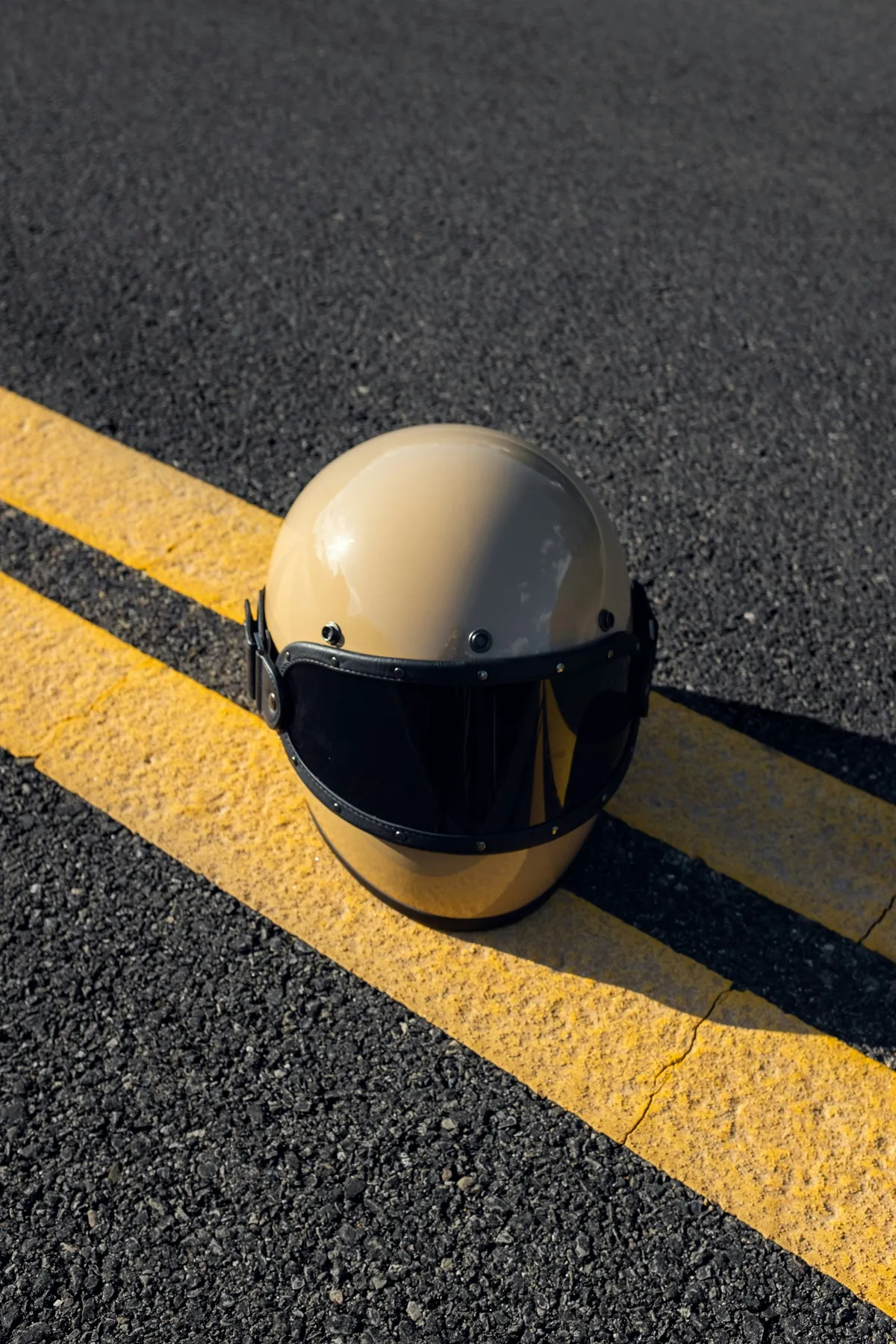5 min read time
Table of Contents

Nevada's Motorcycle Helmet Law
Under the Nevada Revised Statutes, there is a universal helmet law requiring all motorcycle riders to wear a DOT-approved motorcycle helmet.
Failure to follow Nevada's motorcycle helmet law is a traffic violation that may lead to fines and even potentially serious head injuries, spinal injuries, or legal implications in the event of a motorcycle accident.
Penalties for Not Wearing an Approved Helmet in Nevada
Law enforcement officials routinely check helmets at stops, checkpoints, and patrols, confirming they meet U.S. Department of Transportation standards and are securely fastened.
Breaking Nevada's helmet law can result in a helmet law violation, which is a civil infraction under traffic laws.
Common punishments for not wearing a helmet in Nevada include:
- Citation and demerit points
- Fine, which increases based on the number of offenses
- Referring repeat offenders to traffic school or repeating the written knowledge test
Repeat violations may result in a suspended license and increased insurance rates.
However, a single helmet infraction typically costs $200 and adds two demerit points, which can affect both the motorcycle license and insurance premium.
Who Must Wear a Motorcycle Helmet in Nevada?
Understanding who is required to wear a helmet can be confusing, especially with the various vehicle types and exceptions.
Below, we outline the key groups that must comply with Nevada's helmet law, helping motorcycle riders and passengers stay safe and avoid traffic law fines.
Motorcycle Riders vs. Passengers
Riders and passengers are expected to follow the same helmet requirement.
Whether you're steering or riding in the back seat, Nevada law mandates a properly fitted, DOT-approved motorcycle helmet.
Key points to remember for both riders and passengers are:
- Riders must wear helmets at all times.
- Passengers must also wear helmets.
- Both must use eye protection.
Failing to wear a helmet can result in a helmet ticket and may affect compensation amounts in a motorcycle accident claim. Additionally, wearing helmets reduces head injuries and improves safety.
Types of Helmets Approved in Nevada
In Nevada, various helmet types are available that meet state regulations, highlighting differences in design, safety features, and intended use.
Understanding these distinctions helps riders choose gear that complies with federal motor vehicle safety standards and helmet laws.
DOT vs. ECE Certified Helmets
DOT certification is the U.S. standard that ensures a helmet meets the Federal Motor Vehicle Safety Standards, including impact absorption, chin strap strength, and labeling. Riders in the U.S. must choose a helmet with the DOT sticker to comply with Nevada's law and to ensure that helmets meet the required safety standards set for motorcycle operators.
ECE certification is the European standard, recognized worldwide. While it also tests impact and penetration, it allows a broader range of designs. In the U.S., ECE-certified helmets are accepted for interstate travel, but riders should verify that the helmet carries a DOT label or is dual-certified for full compliance, ensuring that the helmet reduces risk and protects riders.
Additional Safety Gear: Eye Protection and Other Equipment
Beyond helmets, riders should consider protective eyewear and other safety gear that safeguards against debris, glare, and motor vehicle impacts.
Properly fitted goggles, face shields, and other protective accessories enhance visibility and reduce the risk of injury during every ride.
The National Highway Traffic Safety Administration (NHTSA) recommends that all riders, especially those in Las Vegas and other busy streets, wear eye protection as part of comprehensive rider safety.
When Is Eye Protection Mandatory for Motorcyclists in Nevada
In Nevada, there is a legal requirement that all riders must wear eye protection when riding a motorcycle that lacks a transparent windscreen.
The eye gear should be DOT-approved goggles that meet modern safety standards, prescription or non-prescription glasses, or a full-coverage face shield.
Common examples of eye protection motorcyclists can choose in Nevada are:
- Goggles: Impact-resistant lenses with a snug fit.
- Glasses: Prescription or non-prescription lenses that block UV and wind.
- Face shield: Full-coverage shield that protects the entire eye area.
Wearing eye protection while riding reduces the risk of eye injury and penalties from the DMV; failure to wear eye protection while riding your motorcycle can result in fines and higher insurance premiums.
Consequences of Riding Without a Helmet in Nevada
Choosing to ride without a motorcycle helmet exposes you to serious head injuries, legal penalties, and potential reductions in compensation in the event of a motorcycle crash.
Civil Tickets and Insurance Rate Increase
A helmet-law violation typically carries a base fine that ranges from $200 to $300, depending on the jurisdiction. Typically, tickets in more high-traffic areas such as downtown Las Vegas tend to be more.
In addition to the traffic penalty, most courts impose demerit points, often two or more, on the rider's driver's license, which can affect insurance rates and eligibility for certain driving privileges.
Assessment fees and special DMV charges can be added on top of the base fine.
These fees cover administrative costs and may include a separate assessment for the vehicle's registration or a public road usage surcharge for motor vehicles and wheeled vehicles. The total amount payable can therefore exceed the base fine by 20-30% or more.
Severe Injury
In the event of a motorcycle accident, if the motorcyclist involved is not wearing a helmet, they can be exposed to a severe head injury or even death.
Additionally, due to not wearing a helmet, the injured motorcyclist could be charged with a civil infraction or misdemeanor offense, which will lower their potential settlement amount.
Regarding whether you were wearing a helmet or not, it's highly recommended that if you were involved in a motorcycle accident in Las Vegas, you contact the Rodney Okano Car Accident Lawyer Law Firm, which can provide you with expert legal advice and navigate your legal process for you.
Schedule a free consultation with a Las Vegas motorcycle accident lawyer from our law firm today by calling (702) 566-3600.
Potential Insurance Impacts of Not Wearing a Helmet
Nevada law requires all motorcyclists to wear helmets while operating their motorcycles on public roads.
Failure to abide by this law can result in fines, and potential insurance impacts can affect coverage limits, premium rates, and claim payouts for motorcyclists involved in motorcycle accidents.
Understanding how helmet compliance and accident circumstances influence insurers helps riders anticipate financial outcomes and plan for legal representation.
Premium Raises for Helmetless Riders Involved in Motorcycle Crashes
When a rider chooses not to wear a helmet, insurers treat the policy as higher risk for motor vehicles, especially for motorcycles.
The lack of protective gear signals a greater likelihood of severe injuries, prompting carriers to raise rates or add riders to the policy.
Common insurance raises include:
- 10-15% increase for standard coverage
- 20-30% hike for high-speed riders
- Optional rider surcharge of $50-$100 annually
- Potential loss of discounts for safe-practice endorsements
Defending a Helmet Citation
Defending a helmet citation can be a complex process that requires a clear understanding of the applicable laws and evidence.
By gathering documentation, reviewing the circumstances of the alleged violation, and exploring potential defenses, you can strengthen your case and potentially reduce or dismiss the charge.
Common Defenses to a Helmet Citation
A rider may contest a helmet citation by proving that:
- The vehicle was not a motorcycle
- The ride occurred on a private driveway
- The ticket was issued in error.
Providing photographic or surveillance evidence, along with a clean driving record, can help negotiate a dismissal or a reduced charge, thereby avoiding demerit points and potential insurance hikes.
Obtain the Compensation You're Entitled To
Contact Us Today
Rodney Okano Car Accident Lawyer is a Las Vegas personal injury law firm with over 20 years of experience helping clients obtain maximum compensation following injuries from accidents such as car crashes, worksite injuries, and slips and falls. Over those years, The Rodney Okano Car Accident Lawyer Law Firm has become an experienced law firm that can ensure exceptional results for any of its clients.






